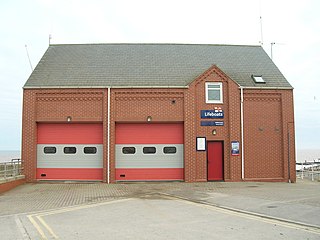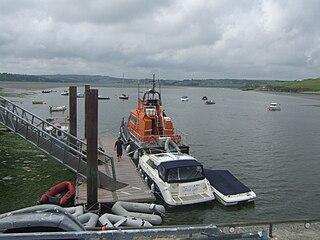
Padstow Lifeboat Station has been at Trevose Head west of Padstow, Cornwall, since 1967. Before that it was at Hawker's Cove on the Camel estuary between the town and the sea. The lifeboat station is run by the Royal National Lifeboat Institution (RNLI), and since 2006 has been the base for Tamar-class RNLB Spirit of Padstow.

Walmer Lifeboat Station is located on The Strand on Walmer promenade, in the county of Kent.

Pwllheli Lifeboat Station is located in the town of Pwllheli, which sits on the Llŷn Peninsula, in the historic county of Gwynedd, Wales.

Eyemouth Lifeboat Station is located at the harbour town of Eyemouth, in the Scottish Borders, Scotland.

Withernsea Lifeboat Station is located in the town of Withernsea, East Riding of Yorkshire, England. It is one of four RNLI stations in the East Riding of Yorkshire, with another five in North Yorkshire.

Ramsey Lifeboat Station is located on Queens Promenade, in the town of Ramsey, in the Isle of Man, a British Crown Dependency.

Whitehaven Lifeboat Station was located in the town of Whitehaven, Cumberland, Cumbria.

Ackergill Lifeboat Station is located at Ackergill Harbour, Highland, in the NE corner of Scotland near the town of Wick, in the historic county of Caithness.

Bamburgh Castle Lifeboat Station is a former Royal National Lifeboat Institution (RNLI) station, which was located at the village of Bamburgh in the county of Northumberland. A lifeboat was first stationed here by the RNLI in 1882.

Cresswell Lifeboat Station is a former Royal National Lifeboat Institution (RNLI) station, which was located at the village of Cresswell in the county of Northumberland. A lifeboat was first stationed here by the RNLI in 1875.

Brancaster Lifeboat Station was located at Brancaster Beach, near the village of Brancaster, on the north coast of the county of Norfolk.

Mornington Lifeboat Station is a former Royal National Lifeboat Institution (RNLI) station in the village of Mornington, on the south side of the River Boyne estuary, near Drogheda in County Meath, Ireland.

Caister Lifeboat Station is located in the village and seaside resort of Caister-on-Sea, on the east coast of the county of Norfolk.

Upgang Lifeboat Station was located just over 1 mile (1.6 km) west of Whitby Harbour, midway between Whitby and Sandsend, on the coast of North Yorkshire.

Saltburn Lifeboat Station was located at Marine Terrace, on Saltburn Road, just to the east side of Saltburn-by-the-Sea, adjacent to the Ship Inn, on the coast of North Yorkshire.

Middlesbrough Lifeboat Station was located on the North Wharf side of the Middlesbrough Dock Cut from the River Tees, in the town of Middlesbrough, in North Yorkshire.

Hornsea Lifeboat Station was located at the junction of Burton Road and Eastbourne Road, in the town of Hornsea, in the county of the East Riding of Yorkshire.

New Romney Lifeboat Station was located across the northern end of Marine Parade, in-between St Andrew's Road and the Coastguard Station, at Littlestone-on-Sea, approximately 1 mile (1.6 km) to the east of New Romney town, on the southern Kent coast.

Courtmacsherry Harbour Lifeboat Station is located on Sea Road, in the village of Courtmacsherry, County Cork, on the southern shore of the Argideen River estuary, approximately 45 kilometres (28 mi) south west of Cork, on the south coast of Ireland.

Crail Lifeboat Station was located 2 miles (3.2 km) north-east of Crail, at Balcomie Links on Fife Ness, a headland at the most easterly point of the Fife peninsula.






















